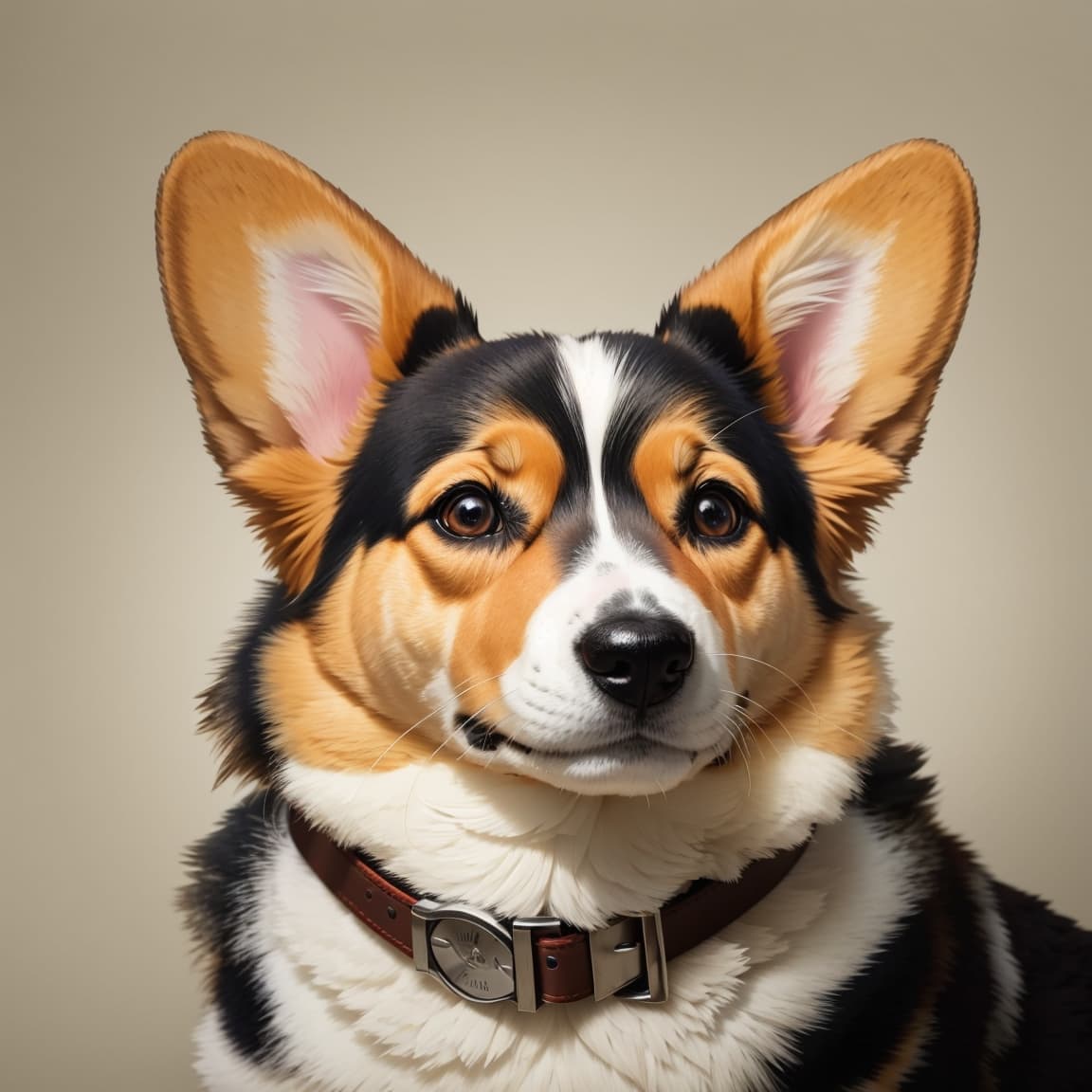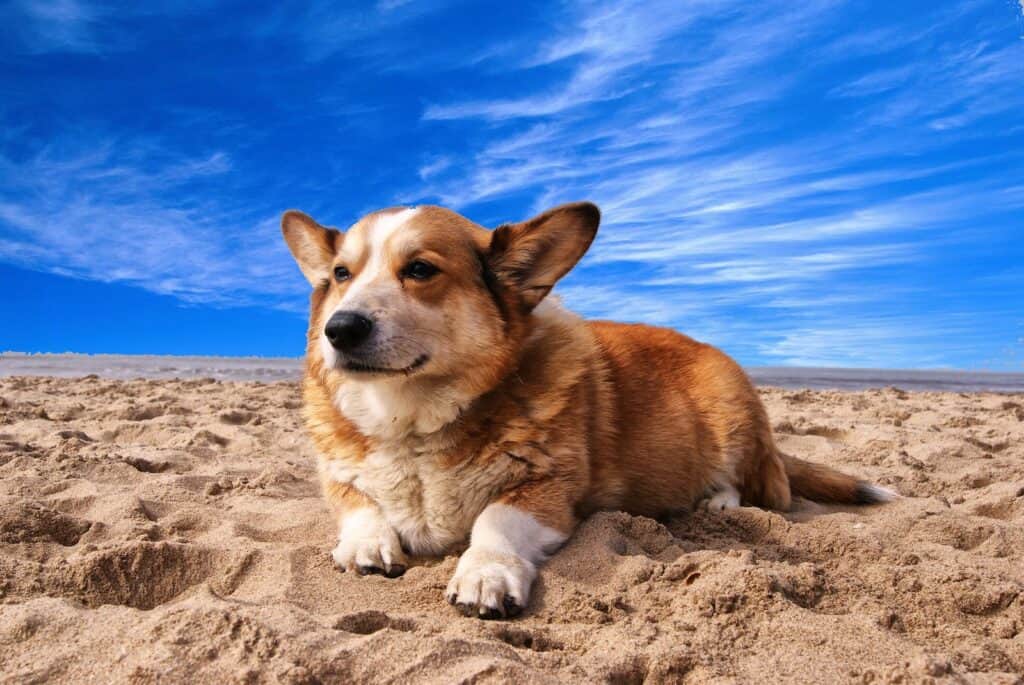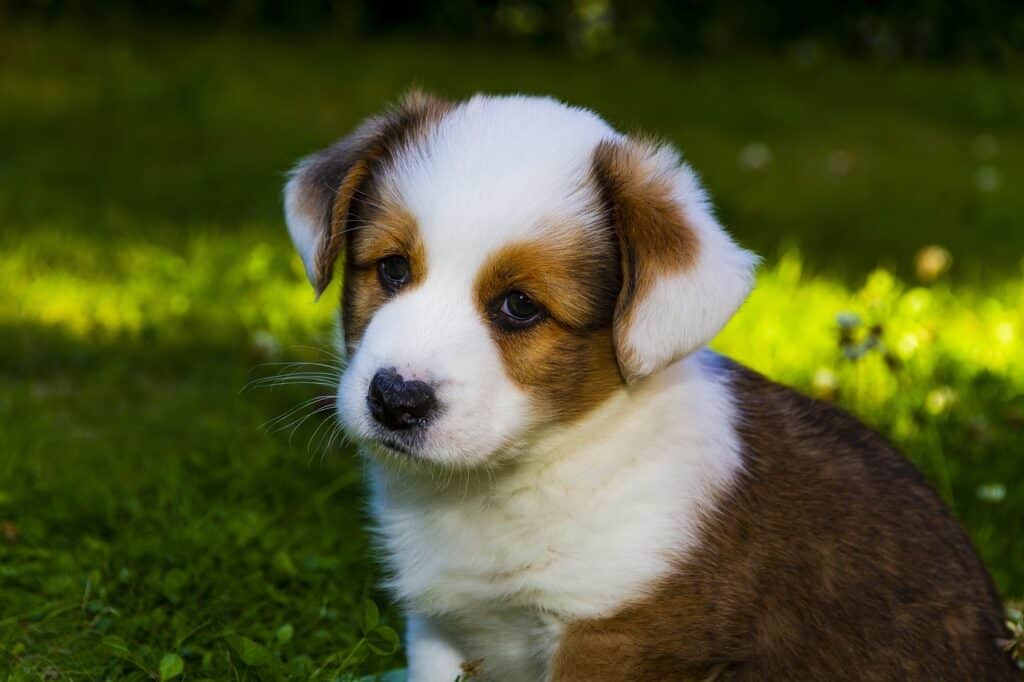The Welsh Corgi (Cardigan), a charming and compact breed known for its distinctive appearance and unwavering loyalty, has earned its place in the hearts of dog enthusiasts and families. With its Welsh origins, adorable physical features, and a unique set of temperament traits, this breed is celebrated as an affectionate and agile companion with a penchant for herding and companionship.

| Category (Explanation) | Breed Information |
|---|---|
| Year of Breed Conception | Ancient |
| Country of Origin | United Kingdom (Wales) |
| Weight (lbs & kg) (Male) | 30-38 lbs (14-17 kg) |
| Weight (lbs & kg) (Female) | 25-34 lbs (11-15 kg) |
| Coat Type | Medium-length double coat |
| Color Variations | Various colors, often with white markings |
| Shedding Level (Low, Moderate, High) | Moderate |
| Height (cm & in) | 10.5-12.5 inches (27-32 cm) |
| Breed Size | Small to medium |
| Trainability (Low, Moderate, High) | High |
| Mental Needs (Low, Moderate, High) | Moderate |
| Intelligence Level (Low, Moderate, High) | High |
| Energy Level (Low, Moderate, High) | Moderate |
| Agility (Low, Moderate, High) | Moderate |
| Loyalty (Low, Moderate, High) | High |
| Playfulness (Low, Moderate, High) | High |
| Exercise Needs | Regular exercise and mental stimulation |
| Guarding Proficiency (Low, Moderate, High) | Low |
| Sociability with Children (Low, Moderate, High) | High |
| Barking Level (Low, Moderate, High) | Moderate |
| Digging Tendency (Low, Moderate, High) | Low |
| Destructive Behavior (Low, Moderate, High) | Low |
| Drooling Level (Low, Moderate, High) | Low |
| Obedience Level (Low, Moderate, High) | High |
| Apartment Friendly (Yes/No) | Can adapt to apartment living with sufficient exercise |
| Inherent Prey Drive | Moderate |
| Physical Risk to Others (Low, Moderate, High) | Low |
| Travel Fatality Risk (Low, Moderate, High) | Low |
| Allergen Potential | Low |
| Health Concerns (List of Common Health Concerns) | Hip Dysplasia, Eye Issues, Back Problems |
| Average Life Expectancy (Life Expectancy in Years) | 12-15 years |
| Croatian Sheepdog: | |
| Category (Explanation) | Breed Information |
| Year of Breed Conception | Ancient |
| Country of Origin | Croatia |
| Weight (lbs & kg) (Male) | 35-49 lbs (16-22 kg) |
| Weight (lbs & kg) (Female) | 29-43 lbs (13-19.5 kg) |
| Coat Type | Medium-length double coat |
| Color Variations | Black or black with white markings |
| Shedding Level (Low, Moderate, High) | Moderate |
| Height (cm & in) | 16-22 inches (40-56 cm) |
| Breed Size | Medium |
| Trainability (Low, Moderate, High) | High |
| Mental Needs (Low, Moderate, High) | High |
| Intelligence Level (Low, Moderate, High) | High |
| Energy Level (Low, Moderate, High) | High |
| Agility (Low, Moderate, High) | High |
| Loyalty (Low, Moderate, High) | High |
| Playfulness (Low, Moderate, High) | Moderate |
| Exercise Needs | Regular exercise and mental stimulation |
| Guarding Proficiency (Low, Moderate, High) | High |
| Sociability with Children (Low, Moderate, High) | High |
| Barking Level (Low, Moderate, High) | Moderate |
| Digging Tendency (Low, Moderate, High) | Low |
| Destructive Behavior (Low, Moderate, High) | Low |
| Drooling Level (Low, Moderate, High) | Low |
| Obedience Level (Low, Moderate, High) | High |
| Apartment Friendly (Yes/No) | Can adapt to apartment living with sufficient exercise |
| Inherent Prey Drive | Moderate |
| Physical Risk to Others (Low, Moderate, High) | Low |
| Travel Fatality Risk (Low, Moderate, High) | Low |
| Allergen Potential | Low |
| Health Concerns (List of Common Health Concerns) | Hip Dysplasia, Eye Issues, Joint Problems |
| Average Life Expectancy (Life Expectancy in Years) | 12-14 years |
| These tables provide information about each of the mentioned dog breeds, including their origin, characteristics, and care requirements. If you need further information or have additional questions, please let me know. |
Woof Mastery is reader supported and our articles may contain affiliate links.
Instead of running third party ads that we have no control of we only use links from high-quality companies we are directly partnered with. Making use of these links come at no cost to you our reader, and in many cases have the extra benefit of discounted rates or sign up bonuses.
If you’re interested you can read more about our affiliate policy here.
We appreciate your support and always insure that the products and services we recommend are high-quality, helpful and relevant to the subject at hand!
The Welsh Corgi (Cardigan) has a history deeply intertwined with Welsh folklore and herding traditions. These dogs have been herding livestock in the hills of Wales for centuries.
Their low stature allowed them to nip at the heels of cattle and sheep without getting kicked. They were cherished for their herding abilities and loyalty to their human companions.
Today, Welsh Corgis (Cardigan) are celebrated for their friendly and spirited nature. They have become beloved family pets, embodying the charm and heritage of Wales.

The Cardigan Welsh Corgi is special for its intelligence and loyalty. These herders were historically used for herding cattle and other livestock. Their adaptability and affectionate nature make them outstanding working dogs and cherished family pets.
Cardigan Welsh Corgis have a history as herding dogs in Wales. Their agility and herding instincts made them adept at managing and protecting livestock. They were known for their intelligence and loyalty. Today, they continue to serve as reliable working dogs and cherished family companions, embodying their tradition as dependable companions.
Cardigan Welsh Corgis are known for their spirited and affectionate personalities. They have a history of herding cattle and other livestock.
Their agility and herding instincts make them excellent herders, and they have a loving and loyal nature. Cardigan Welsh Corgis are characterized by their agility, devotion, and a sweet disposition, epitomizing the ideal blend of vitality and companionship.
Cardigan Welsh Corgis are loyal and alert. They are typically good with children and other pets but may be reserved with strangers. Early socialization is important for a well-adjusted temperament.
Mental and physical exercise is crucial for their well-being.
Cardigan Welsh Corgis are small dogs with a sturdy and long body. They have expressive, oval eyes that come in various colors, and their ears are rounded and often larger than those of the Pembroke Corgi. The double coat is dense and weather-resistant, often in shades of red, sable, brindle, black, and blue merle with white markings. They have a cheerful and lovable presence.
Cardigan Welsh Corgis come in coat colors such as red, sable, brindle, black, and blue merle, often with white markings. They may not have distinct coat colors.
Cardigan Welsh Corgis come in coat colors such as red, sable, brindle, black, and blue merle with white markings without distinct coat patterns.
Cardigan Welsh Corgis have a moderate shedding level. They shed consistently with increased shedding during seasonal changes. Regular grooming and brushing can help control shedding and maintain their coat.
Cardigan Welsh Corgis have a double coat that requires regular grooming to keep it healthy and minimize shedding. Grooming habits for this breed include:
1. Brushing: Regular brushing, about once or twice a week, is essential to prevent matting and remove loose fur. Use a slicker brush or an undercoat rake for thorough grooming.
2. Bathing: Bathe Cardigan Welsh Corgis when necessary using a dog-specific shampoo and ensure thorough rinsing.
3. Ears: Check and clean their ears regularly with a veterinarian-recommended solution to prevent wax buildup or infections.
4. Nails: Keep their nails trimmed to a comfortable length to maintain proper gait and prevent discomfort.
5. Teeth: Dental hygiene is important. Brush their teeth regularly to prevent dental issues and bad breath. Dental chews or toys can also help.
6. Tail and Paw Care: Pay attention to the tail and paw areas, where dirt and debris can accumulate. Keep them clean and inspect for any signs of irritation or injury.
Cardigan Welsh Corgis have a moderate to high activity level and enjoy both physical and mental challenges. Key points about their activity level include:
1. Exercise Needs: Cardigan Welsh Corgis require daily exercise to stay content. Activities can include walks, playtime, and interactive tasks.
2. Energy Level: They have a moderate to high energy level, especially when young. Regular exercise helps prevent restlessness.
3. Herding Heritage: Historically, Cardigan Welsh Corgis were bred for herding livestock. They excel in activities like obedience training, agility, and herding trials.
4. Mental Stimulation: In addition to physical exercise, mental challenges through training and interactive games are important to keep them mentally sharp.
5. Family Companions: They make good family pets and enjoy spending time with their human companions.
Cardigan Welsh Corgis are intelligent dogs known for their problem-solving abilities and adaptability. Here are some key points about their intelligence:
Cardigan Welsh Corgis’ intelligence makes them effective working dogs and beloved companions when provided with proper training and mental stimulation.
Mental Stimulation: Cardigan Welsh Corgis are intelligent dogs that require mental stimulation. Engage them with puzzle toys, obedience training, and interactive games to keep their minds sharp and prevent boredom.
Social Interaction: Corgis are social animals and thrive on human interaction. Regular companionship and attention from their owners are essential to prevent loneliness and separation anxiety.
Training and Obedience: Obedience training is beneficial for Cardigan Welsh Corgis. It not only provides mental stimulation but also strengthens their bond with their owners. Consistent, positive-reinforcement training helps shape their behavior.
Routine and Structure: Like most dogs, Corgis benefit from a predictable daily routine. Establishing a consistent schedule can help them feel secure and reduce anxiety.
Affection and Attention: Show affection and spend quality time with your Cardigan Welsh Corgi. They are loyal dogs that crave human companionship.
Socialization: Early socialization is vital to help them become well-adjusted dogs. Expose them to various people, animals, and environments to build their confidence and prevent shyness or fearfulness.
Safe Environment: Create a safe and comfortable space at home where they can relax and feel secure. Provide a designated area for them to retreat to if they need some alone time.
Consistency: Consistency in training and daily routines helps Cardigan Welsh Corgis feel more secure and confident in their environment.
Enter The Woof Mastery

If you’re considering a Welsh Corgi (Cardigan), here are important factors to know:
1. Activity Level: Corgis are active dogs that require regular exercise and mental stimulation.
2. Training Commitment: They are intelligent but can be stubborn, so consistent training is important.
3. Space: Corgis adapt well to smaller living spaces but need outdoor playtime.
4. Shedding: They have a moderate shedding level, and regular grooming helps manage their coat.
5. Herding Instinct: Be prepared for their natural herding behaviors, which may include nipping at heels.
Welsh Corgis, including the Cardigan variety, may pose a physical risk to others if not properly socialized, trained, or managed. The risk assessment factors include:
1. Herding Instinct: Welsh Corgis have a herding instinct, which may lead to chasing or nipping at people or other animals. Proper training is essential to manage this behavior.
2. Socialization: Early and thorough socialization is crucial to ensure Welsh Corgis are comfortable around people and other animals. Poor socialization can lead to fear or aggression.
3. Training: Obedience training is essential to teach Welsh Corgis appropriate behavior and ensure they respond to commands. Well-trained dogs are less likely to engage in aggressive behavior.
4. Owner Responsibility: Responsible ownership involves being aware of the dog’s behavior and taking necessary precautions in public settings.
5. Breed-Specific Legislation (BSL): Welsh Corgis are generally not subject to BSL, but owners should be aware of local regulations.
6. Individual Variability: Each dog is unique, and behavior can vary. Responsible ownership, proper training, and socialization are key to minimizing the potential physical risk to others.
Cardigan Welsh Corgis are often good with children. They are affectionate and enjoy playtime. Their herding instincts may lead to them trying to gather and protect children, but this behavior is generally manageable with training and socialization.
Cardigan Welsh Corgis can be good swimmers, despite their shorter legs. Their coat colors do not hinder their swimming ability. Many may enjoy being in the water and can paddle. However, always be cautious with their safety in the water and provide close supervision, especially if they are swimming in deep or strong currents.
Positive training practices will help your Cardigan Welsh Corgi puppy become a well-behaved and devoted companion.
Cardigan Welsh Corgis are generally moderate in terms of noisiness. They may bark to alert their owners to potential threats or strangers, but their barking is usually not excessive.
Cardigan Welsh Corgis are adaptable and social dogs that thrive in specific living conditions. Here are the best conditions for their well-being:
Challenges:
Traveling with Welsh Corgis (Cardigan) involves these considerations:
Welsh Corgis (Cardigan) are generally healthy, but they may be prone to certain health concerns, including:
Proper nutrition is essential for Cardigan Welsh Corgis. Follow these nutritional habits:
Proper nutrition is essential for the health and well-being of Cardigan Welsh Corgis.
Breed-specific laws (BSL) may affect Welsh Corgis (Cardigan) in certain areas, and owners should be aware of these regulations. BSL is typically enacted at the local or municipal level and can vary widely from one jurisdiction to another. Here are some types of restrictions that Welsh Corgis (Cardigan) may face under BSL:
The rationale for BSL is often based on concerns about public safety and perceived risks associated with specific breeds. While Welsh Corgis (Cardigan) are not inherently aggressive, they can be affected by BSL due to their physical resemblance to breeds that are sometimes included in these laws.
It’s important to note that BSL is a controversial topic, and many advocates argue that it unfairly targets breeds rather than addressing individual dog behavior. They emphasize that responsible ownership, training, and education should be emphasized instead of breed-specific restrictions.
To determine if there are breed-specific laws or restrictions regarding Welsh Corgis (Cardigan) in your area, you should check with your local animal control or government authorities. Be aware of and comply with any local regulations to ensure that you are in compliance with the law while owning a Welsh Corgi (Cardigan).
Woof Mastery is reader supported and our articles may contain affiliate links.
Instead of running third party ads that we have no control of we only use links from high-quality companies we are directly partnered with. Making use of these links come at no cost to you our reader, and in many cases have the extra benefit of discounted rates or sign up bonuses.
If you’re interested you can read more about our affiliate policy here.
We appreciate your support and always insure that the products and services we recommend are high-quality, helpful and relevant to the subject at hand!
Myth 1: Cardigan Welsh Corgis are the Same as Pembroke Welsh Corgis
Truth: Cardigan and Pembroke Welsh Corgis are distinct breeds with their own characteristics. They differ in history, appearance, and traits.
Myth 2: They Don’t Need Exercise
Truth: Cardigan Welsh Corgis are active dogs and require regular exercise. They enjoy playtime and mental stimulation.
Cardigan Welsh Corgis have gained recognition in various roles, with some famous examples including:
These Cardigan Welsh Corgis have contributed to the breed’s recognition and popularity in various roles, from political events to the world of entertainment.
Cardigan Welsh Corgis have been owned and cherished by families and individuals who value their herding and companionship. Specific historical owners may not be widely known, but these dogs have a rich history as herders and loyal companions.
Welsh Corgis (Cardigan), like all breeds, face certain challenges and dangers. Some of the greatest dangers and concerns for the breed include:
By understanding these challenges and providing responsible ownership and care, many of these dangers can be mitigated to ensure the well-being of Welsh Corgis (Cardigan).
The Cardigan Welsh Corgi shares its ancestry with the Pembroke Welsh Corgi. It’s believed that Viking invaders brought early Corgi-type dogs to Wales, which later interbred with local herding dogs. The breed’s development aimed to create small herding dogs with strong work ethics and herding abilities.
The Welsh Corgi (Cardigan) is a breed known for its charm, intelligence, and herding skills. They excel in herding and companionship roles, captivating dog enthusiasts with their unique characteristics and affectionate nature.
Owning a Welsh Corgi (Cardigan) involves providing mental and physical stimulation, grooming, and regular veterinary care. Responsible ownership includes addressing potential health concerns and nurturing their herding instincts through training.
With their expressive eyes and joyful personality, Welsh Corgis (Cardigan) continue to capture the hearts of those who appreciate their distinct traits and loyal companionship.